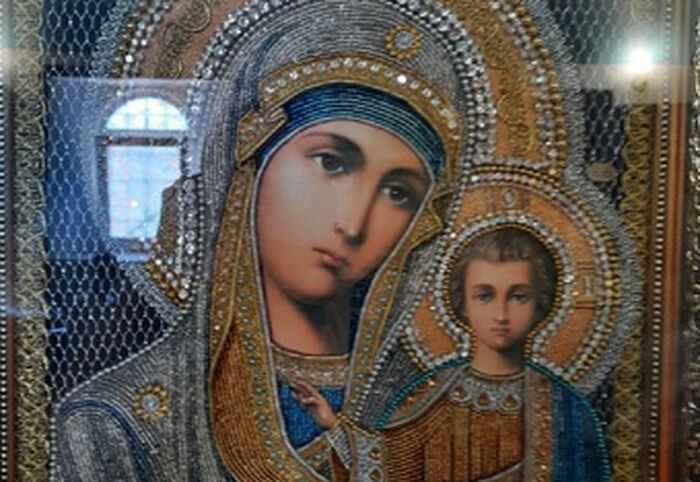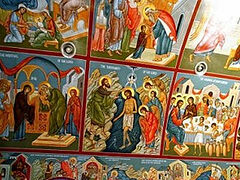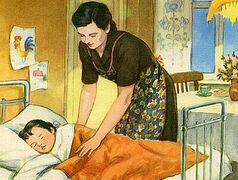 The Kazan Icon of the Mother of God, made by Zoya Nikolaevna Fomenko
The Kazan Icon of the Mother of God, made by Zoya Nikolaevna Fomenko
I only want to tell readers bright stories; but, alas, life is much more complex. Dark stories with their bitter lessons can also teach us something, and so they have a positive meaning provided we listen carefully.
I recently read an article by Archpriest Alexander Saltykov on modern icon-painting—on what a careless attitude we have begun to have regarding it and how easily we have introduced an element of “personal creativity”, blurring the boundaries of the canons and giving free rein to human egoism and conceit...
It’s a difficult yet important subject. We have come to the point where patterns for embroidering beaded icons are posted online by people who are far from understanding the basic rules of icon-painting. And so people keep bringing these “home-made” icons to church, and we priests keep blessing these “spiritual” images with a sigh of indulgence, subject to at least elementary canonical rules... We do out of sympathy for people and making allowance for the simplicity and sincerity of the women who are at least introduced to the Church and spiritual life in this way.
Sometimes we have to bless such an image merely as a “pious picture”, explaining patiently why it cannot be called an icon. We could be strict and kick out all self-styled iconographers, but will this bring positive results? Will this serve the main goal of our ministry—the sanctification and integration of people into Church life? I doubt it. Because strictness is appropriate when a person has at least some idea about spiritual sobriety, humility and obedience. Otherwise our strictness will turn that person away from the Church threshold for many years, if not forever.
All of the above are signs of our spiritual slackness and decline. I will tell readers a story so that we can once again think about what a great, responsible and even terrible work iconography is. It is sobering, bitter, and even terrible, but at the same time relevant in our careless and slack times, when we don’t even know how slack we are.
***
About five years ago I was introduced to an elderly lonely artist who made beaded icons (or, rather, covers for them) of amazing beauty. Zoya Nikolaevna (that was her name) was an Honored Artist of Ukraine and a professional embroiderer. In addition, she was an exceptionally conscientious, accurate and even pedantic person in everything related to the quality of work. And this despite the fact that at the time when I met her she had very poor eyesight and worked in glasses with powerful diopters under the bright light of a table lamp. and she worked with special small beads of the broadest palette of colors and shades. With regard to the canons of iconography she was extremely responsible and even scrupulous, but... The trouble was that Zoya Nikolaevna did not know much about church life. She had faith “in her soul”, occasionally attended church (without confession or Communion), knew the diocesan life well and knew many Church people; but this was a manifestation of her cultural and mental rather than spiritual activity.
An orphan from birth, Zoya Nikolaevna studied in an orphanage and with difficulty rose in the world, went through all the degrees of art education, married a respected and learned man and gave birth to a son... But her happiness did not last long. In the “crazy nineties” Zoya Nikolaevna retired, became a widow, was left alone with her son with virtually no means of subsistence, and her son began to demonstrate deviant behavior and eventually ended up in a psychiatric hospital. Then he somehow managed to move to Spain.
So I met Zoya Nikolaevna at the period of her life when she had lost her “professor’s” apartment after being deceived by frauds and ended up all alone in miserable quarters of an old post-war apartment block, and earned her living solely by crafting beaded icons all night long in order to send some money to her sick son in Spain. This is what I learned from her. I wanted to somehow support her and ordered a large Kazan Icon of the Mother of God for our church in the Crimean village of Pochtovoye.
My first meeting with Zoya Nikolaevna took place in her apartment. And what immediately struck me there? First of all, her decency and professionalism, coupled with kindness towards everyone who had deceived and offended her. But there was something that caused a bitter sigh and the desire to convey to her that such an attitude to this work was unacceptable. The first thing that I heard when visiting Zoya Nikolaevna was the TV, working incessantly and extremely loudly. It is common for many elderly and lonely people to maintain a “sound background” that gives them a feeling of fullness in life. Many pious lay people listen to Orthodox channels, while at Zoya Nikolaevna’s, meaningless and uncompassionate talk shows were always on. I could not understand how it was possible to combine those infernal narratives with the responsible work of making icons and spoke about this to her more than once, but she made excuses by saying that this was “just a background” and that she was just used to it.
Besides, Zoya Nikolaevna had been a hopelessly heavy smoker for many years and never kept the fasts... So there were things that were unacceptable from the point of view of observing the ascetic rules of an iconographer, which I honestly and delicately tried to remind Zoya Nikolaevna about; but she didn't hear me. There was no stubbornness or conscious resistance in this, but she seemed to be incapable of perceiving the seriousness and importance of these exhortations.
After some time, Zoya Nikolaevna called me and said that the icon was ready, and I could come and take it. I am not an expert in iconography, but from the purely aesthetic point of view, her icon was really stunning and beautiful! I thanked her, sincerely expressing my admiration, paid her the money collected by the parishioners, and Zoya Nikolaevna donated a few more icons--albeit smaller ones, but of high quality as well. She had a truly generous soul...
Some time later, one of our parishioners ordered an icon of the Savior as a pair to the Kazan one. The parishioners began to raise funds without my knowledge, but I surrendered. I phoned Zoya Nikolaevna and asked her to make a new icon.
However, something was going wrong with the new icon from the very start…
The work progressed more slowly than with the first icon, so it dragged on not even for weeks, but for months. I called Zoya Nikolaevna to find out how things were going. I felt that there was some obstacle and guessed that the reason was in the non-observance of the ascetic rules, but I was unable to change anything.
At some point it occurred to me to suggest that Zoya Nikolaevna confess and take Communion. Although she had already confessed and taken Communion, it was a very long time ago, maybe once in her life. She had a complex attitude towards Church life largely due to her disappointments and even deceit on the part of some “Church” people, which compelled her for many years to distrust and be wary of everything in the Church except for the sphere of her work.
I somehow managed to persuade her to prepare a little for confession and Communion. She prepared as best she could, and I came, heard her confession and gave her Communion. A couple of weeks later she phoned me and said happily that the icon was almost ready and all that was needed was for me to come and look at it and clarify some details. I arrived, bringing the agreed amount with me, and paid her right away, especially since I knew that Zoya Nikolaevna was in need and wanted to make another transfer to her son.
I arrived. Zoya Nikolaevna received me cordially as usual, and showed me the icon. I was glad that the work was nearly finished. I said goodbye to her and we agreed to meet again soon. It was in late March.
After April 2 she no longer answer my calls, and a couple of days later her alarmed neighbor phoned me and asked if I knew of Zoya Nikolaevna’s whereabouts. I told her everything I knew. A day later, the same neighbor told me the terrible news: Zoya Nikolaevna was found dead in her apartment. First the neighbor tried to get through to her, then she contacted a few acquaintances and finally decided to call the police... When they broke down the door, they found Zoya Nikolaevna lying on the floor in the room where she used to work.
The cause of her death was unknown. The neighbor only said that a couple of days before disappearing, Zoya Nikolaevna had felt unwell (“poisoned by some chicken”, as she believed), but then she felt better... How sad it was for me to hear that she was eating chicken during Great Lent! The cause of her death was finally declared to be “heart failure” or something, and a few days later Zoya Nikolaevna’s body was sent from the morgue for burial. The neighbor as her confidant took the lead in organizing the funeral.
I wanted to serve the funeral for Zoya Nikolaevna. But on the day of her funeral something extraordinary, even mystical, happened. Two hours before her funeral at the Simferopol cemetery I was asked to urgently serve another funeral in the vicinity of the village of Priyatnoye Svidaniye. I drove my Opel with difficulty along the rural roads which had almost been washed away by the spring thaw.
I arrived, left the car on a hillock, served the funeral over the deceased person and returned to the car. The grooves that kept my trunk open were so worn out that they didn’t keep it open. But when the car was on level ground, I would open the trunk all the way up and it held. This time the car was not level, and I didn’t take that into account. As usual, I opened the trunk, began to put my briefcase inside and suddenly felt a heavy blow to my head. It was so unexpected that I didn’t immediately realize that I had been hit by the hatch that had slammed shut on me. It was a strange and absurd situation. I was confused, and when blood began to flow down my face, I took a little holy water from the bottle, washed the wound, covered it with a handkerchief, clapped on my skufia, and set off, still unsure where I would go. I was driving and thinking: “In forty minutes I’m supposed to be at the Simferopol cemetery and serve the funeral over Zoya Nikolaevna. But here is such an odd thing, as if the Lord is either admonishing me with love for something or demons have ganged up, resisting the funeral service for Zoya Nikolaevna. Or maybe both...”
I decided to go home first. My wife filled the wound with hydrogen peroxide, made a gauze bandage, and, looking like this I went to the cemetery...
The funeral was attended by five people: a neighbor, Zoya Nikolaevna’s old artist friend, a local historian Oleg Shirokov who had introduced me to her, and her old friends Vladimir and Zoya.
Zoya Nikolaevna’s face in the coffin had an air of suffering, and I thought that her death probably hadn’t been “painless, blameless and peaceful”. It was somewhat comforting that a couple of weeks earlier she had confessed and taken Communion. I was also reassured by the thought that perhaps by her suffering Zoya Nikolaevna had washed away her sins, including those we spoke about above...
After the funeral I asked her neighbor to give me the icon of the Savior that Zoya Nikolaevna had made for our church. A couple of days later the neighbor called and told me some criminal details of Zoya Nikolaevna’s death. It turned out that all her money was gone, along with the icons: both the unfinished and the finished ones, which had hung on the walls of the second room (which the neighbor hadn’t entered on the day Zoya Nikolaevna was found dead). I asked the neighbor why she hadn’t reported the incident to the law-enforcement agencies at once, and she confessed that she was simply afraid, supposing that the police officers had themselves taken all this. I, too, called a lawyer and consulted with him. But he said that it should have been done immediately in the presence of attesting witnesses—but now it was too late.
Several months later a notice came from the diocese that a gang of raiders, who had mainly been engaged in the theft of church items, had just been detained. They were detained in Belarus, but according to preliminary data, the gang had also been active in the Crimea. So we—the parish priests—were asked to report if anyone had suffered from those “church” criminals.
I wanted to tell them my story, but I thought: “Even if this is true and they robbed and killed Zoya Nikolaevna, and even if our icon or other Zoya Nikolaevna’s icons pop up somewhere, will I do the right thing as a priest by aggravating their punishment?” After all, the Lord said: Vengeance is Mine; I will repay (Rom. 12:19). I pondered this and didn’t say anything, giving everything into the hands of God. I just prayed for the robbers that the Lord would bring them to repentance and they would mend their ways if they had really been involved in the crime.
That’s actually the end of the story.
I pray for Zoya Nikolaevna regularly, and every time I think: Maybe it’s my fault that this happened to her? Maybe I was not strict enough in not demanding compliance with the canonical rules? Maybe I should have refused to cooperate with the wonderful embroiderer if she was not ready to comply with the rules? But, on the other hand, what would have happened without my involvement? If I had refused to help her, no one knows whether this would have been for her good... And would she have escaped the bitter lot that befell her?
There are a lot of questions, but there are no clear and definite answers to them. But in any case, this story makes me think over and again about our general carelessness in regard to spiritual and Church life. Negligence and frivolity, all the more turning into a habit, threaten to result in suffering and troubles, inevitable and necessary in view of the height of our vocation. For it is better for us here on earth to experience a “cleansing punishment” than to lose grace-filled eternity.
I ask everyone to pray for the repose of the ever-memorable servant of God Zoya.
Forgive us all, O Lord! Enlighten, cleanse and sanctify us!




